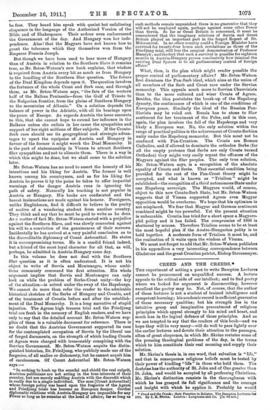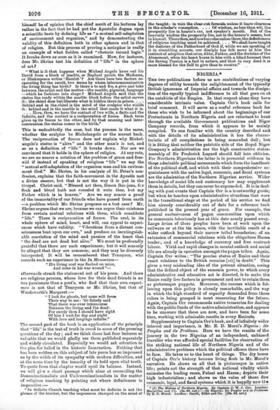CREED AND THE CREEDS.•
THE experiment of setting a poet to write Bampton Lectures cannot be pronounced an unqualified success. A lecture
appeals to the critical side of our intellect; and to find poetry where we looked for argument is disconcerting, however excellent the poetry may be. Not, of course, that the author of these lectures is not a student of trained intelligence and competent learning; his academic record is sufficient guarantee of these necessary qualities; but his strength lies in the intuitive grasp and imaginative presentment of religious principles which appeal strongly to his mind and heart, and much less in the logical defence of those principles. And so we are tempted to say that the readers of this book—and we hope they will be very many—will do well to pass lightly over the earlier lectures and devote their attention to the passages, often of great eloquence, in which Mr. Skrine restates some of the pressing theological problems of the day, in the terms which to him constitute their real meaning and supply their solution.
Mr. Skrine's thesis is, in one word, that salvation is "life," and that in consequence religious beliefs must be tested by their power of kindling "life" in those who hold them. The doctrine has the authority of St. John and of One greater than St. John, and would be accepted by all professing Christians. Mr. Skrine's distinction consists in the thoroughness with which he has grasped its fall significance and the courage and insight with which he applies it. Probably he would
• Creed and the Creeds: their Function in Religion. The Hampton Lectures fog 1911. By 1, H. Skrine, London ; Longmans and Co, [7s. 8d net.]
himself be of opinion that the chief merit of his lectures lay rather in the fact that he had put the Apostolic dogma upon
a scientific basis by defining life as "a mutual self-adaptation of environment and organism," and by demonstrating the
validity of this definition both in other spheres and in that of religion. But this process of proving a metaphor is really an example of what Selden called "rhetoric turned logic."
It breaks down as soon as it is examined. How, for instance, does Mr. Shrine test his definition of " life " in the sphere of art ?
"What is it that happens when Michael Angelo hews out his David from a block of marble, or Raphael paints the Madonna, or Shakespeare writes 'Hamlet '? Are there here two factors co- operating for the result, two terms by whose intercommunication the living thing has birth? Is there a to and fro, a give and take between the artist and the matter—the marble, pigment, language —which he fashions into shape ? Michael Angelo said that the statue lies ready within the marble block before the artist carves it : the chisel does but liberate what is hidden there in prison. . . . Behind and in the chisel is the mind of the sculptor who wields it: behind and in the marble is the mind that made it what it is. . . . Here, then, we have the contact of two wills, a finite and the Infinite, and the contact is a reciprocation of forces. Each term gives up its forces to the other, and by that crossing and inter- communion the statue comes to the birth."
This is undoubtedly the case, but the process is the same, whether the sculptor be Michelangelo or the merest hack.
The reciprocation of forces does not explain why Michel- angelo's statue is "alive" and the other man's is not, and so as a definition of " life " it breaks down. Nor are we convinced that it holds in the sphere of religion. At any rate, we are no nearer a solution of the problem of grace and free- will if instead of speaking of religious " life " we say the " mutual self-adaptation of the organism malt and his environ- ment God." Mr. Skrine, in his analysis of St. Peter's con- fession, explains that the faith-movement in the Apostle met a divine answer, but that is not the way it is put in the GospeL Christ said, "Blessed art thou, Simon Bar-jona, fcr flesh and blood bath not reuse/ea it unto thee, but my Father which is in heaven." Are we any nearer a proof of the immortality of our friends who have passed from earth —a problem which Mr. Shrine proposes as a test ease Mr. Skrine argues that we are, because we can argue their existence from certain mutual relations with them, which constitute "life." There is reciprozation of forces. The soul, in its whole sphere of mind, heart, and will, can appeal to experi- ences which have validity. "Vibrations from a distant con- sciousness beat upon our own," and produce an inextinguish- able conviction of the mind and passion of the heart that "the dead are not dead but alive." We must be profoundly grateful that there are such eaperiences ; but it will scarcely be alleged that they are common; and they may be diversely interpreted. It will be remembered that Tennyson, who
records such an experience in the In Memoriam- " His living soul was flashed on mine, And mine in his was wound "—
afterwards struck the statement out of his poem. And there are religious persons, whose love for their dead friends is no less passionate than a poet's, who find that their own experi- ence is not that of Tennyson or Mr. Skrine, but that of Wordsworth's Margaret :—
"I look for ghosts, but none will force Their way to me : 'tis falsely said That there was ever intercourse Between the living and the dead : For surely then I should have sight Of him I wait for day and night With love and longings infinite."
The second part of the book is an application of the principle that "life" is the test of truth in creed to some of the pressing questions of the day ; and we think these last four lectures so valuable that we would gladly see them published separately and widely circulated. Especially we would ask attention to the plea for belief in the historic Incarnation. Nothing that
ha.s been written on this subject of late years has so impressed us by the width of its sympathy with modern difficulties, and at the same time by the tenacity of its hold upon vital truth. To quote from that chapter would spoil its balance. Instead, we will give a short passage which aims at reconciling the Denominationalists and 1Judenominationalists in the matter of religious teaching by pointing out where definiteness is imperative
In definite Church teaching what must be definite is not the phrase of the teacher, but the impression stamped on the mind of the taught : in vain the clear-cut formula unless it leave clearness in the scholar's conception. . . . Of wisdom, no lea than wit, the prosperity lies in hearer's ear, not speaker's mouth. But of the heavenly wisdom the prosperity lies, not in the hearer's senses, but in his soul. There then, and nowhere else unless there, the definiteness of religious teaching must be achieved. • • . We shall have taught the doctrine of the Fatherhood of God if, while we are speaking of it in stumbling accents, our disciple has felt move in him the instinct of adoption that cries, .A.bba, Father, and the doctrine of the Atonement, when his heart burns in him with a blind forecast that the Saving Passion is a fact in nature, and that in very deed it is more blessed for the Self to give than to receive.'



















































 Previous page
Previous page